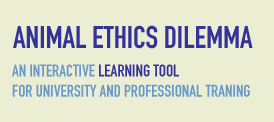

 |
| |
|
The Utilitarian View
|
|
“Morality is about maximising human and animal well-being” |
|
| Animals, like humans, deserve moral consideration. What matters in our dealings with animals is the extent to which we affect their well-being. In deciding what to do, we must therefore consider welfare consequences for animals as well as potential benefits for humans. Activities which have an adverse impact on the well-being of animals may be justified if, all things considered, they lead to a net increase in welfare (for humans or other animals) |
|
 Killing animals (e.g. for food) may be justified if the farming conditions are not detrimental to animal welfare and the killing is humanely performed. Killing animals (e.g. for food) may be justified if the farming conditions are not detrimental to animal welfare and the killing is humanely performed.Examples of statements typically made on the basis of this view: “Modern animal production is problematic because there is a negative effect on animal welfare which is not counterbalanced by the human benefits.” “Some animal research may be justified by its vital importance, as it may enable us to find cures for alleviate painful diseases.” “It is sometimes better for stray cats to be euthanased, as they would otherwise live very poor lives. The remaining stray cat population may benefit as well, because there will be less competition for food.” |
|
|
|
|